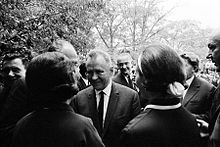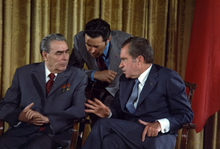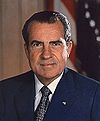- Détente
-
- For the American thrash metal band, see Detente (band).
Détente (French for 'relaxation')[1] is the easing of strained relations, especially in a political situation. The term is often used in reference to the general easing of relations between the Soviet Union and the United States in the 1970s, a thawing at a period roughly in the middle of the Cold War. In the Soviet Union, détente was known in Russian as разрядка ("razryadka", loosely meaning 'relaxation of tension').
The period was characterized by the signing of treaties such as the SALT I, SALT II, and the Helsinki Agreement. There is some debate amongst historians as to how successful the détente period was in achieving peace. It did, however, mark the first time in the Cold War period that the US and the USSR worked together to lessen international tensions, caused primarily by Mutual Assured Destruction. The first Strategic Arms Limitation Talks (SALT) treaty, agreed for both countries to halt the production of nuclear weapons and missiles. It was the first step towards solving one of the most important issues that was disabling any kind of relationship between the USSR and the US. The two superpowers also agreed to install a direct hotline between Washington DC and Moscow, the so called red telephone, enabling both countries to quickly interact with each other in a time of urgency. The SALT II pact of the late 70s continued the work of the SALT I talks, ensuring further reduction in arms by the Soviets and by the US. The Helsinki Accords, in which the Soviets promised to grant free elections in Europe, has been seen as a major concession to ensure peace by the Soviets.
Détente ended after the Soviet's invasion of Afghanistan, which led to America's boycott of the 1980 Olympics in Moscow. Ronald Reagan's election as president in 1980, based on an anti-détente campaign, marked the close of Détente and a return to Cold War hostilities.
Contents
Causes
The NATO powers and the Warsaw Pact both had strong reasons to seek relaxation in tensions. Leonid Brezhnev and the rest of the Soviet leadership felt that the economic burden of the nuclear arms race was unsustainable. The American economy was also in financial trouble as the Vietnam War drained government finances at the same time as Lyndon Johnson (and to a lesser extent, Richard Nixon) sought to expand the welfare state.
In West Germany, the Ostpolitik of Willy Brandt was decreasing tensions; the Soviets hoped more trade with Western Europe would be possible.[clarification needed].
Worsening relations with the People's Republic of China, leading to the Sino-Soviet Split, had caused great concern in the Soviet Union. The leadership feared the potential of a Sino-American alliance against them and believed it was necessary to improve relations with the United States. Improved relations with China had already thawed the general American view of communism.
Rough parity had been achieved in stockpiling nuclear weapons with a clear capability of mutually assured destruction (MAD). There was also the realization that the "relative gains" theory as to the predictable consequences of war might no longer be appropriate. The goal was a "sensible middle ground".
Brezhnev and Nixon each hoped improved relations would boost their domestic popularity and secure their power.
Several anti-nuclear movements supported détente. The Cuban Missile Crisis showed how dangerous the relations between the USSR and the USA were becoming. John F. Kennedy and Nikita Khrushchev wished to reduce the risk of a nuclear war, as they were aware that the nuclear arsenals on each side granted mutually assured destruction.
Summits and treaties
 Soviet Premier Alexei Kosygin (in front) next to U.S. President Lyndon B. Johnson (behind) during the Glassboro Summit Conference
Soviet Premier Alexei Kosygin (in front) next to U.S. President Lyndon B. Johnson (behind) during the Glassboro Summit Conference
The most obvious manifestation of détente was the series of summits held between the leaders of the two superpowers and the treaties that resulted from these meetings. Earlier in the 1960s, before détente, the Partial Test Ban Treaty had been signed on August 5, 1963. Later in the decade, the Nuclear Non-Proliferation Treaty and Outer Space Treaty were two of the first building blocks of détente. However, these early treaties did little to curb the superpowers' abilities, and served primarily to limit the nuclear ambitions of third parties that could endanger both superpowers. But the most significant thing before signing the treaty was the establishment "Hot line"(direct telecommunication between Kremlin and White House) on June 20,1963. This created a kind of trust between the two parties and initiated the Détente process.
The most important treaties were not developed until the advent of the Nixon Administration, which came into office in 1969. The Political Consultative Committee of the Warsaw Pact sent an offer to the West, urging to hold a summit on "security and cooperation in Europe". The West agreed and talks began towards actual limits in the nuclear capabilities of the two superpowers. This ultimately led to the signing of the SALT I treaty in 1972. This treaty limited each power's nuclear arsenals, though it was quickly rendered out-of-date as a result of the development of MIRVs. In the same year that SALT I was signed, the Biological Weapons Convention and the Anti-Ballistic Missile Treaty were also concluded. Talks on SALT II also began in 1972.
In 1975, the Conference on Security and Cooperation in Europe met and produced the Helsinki Accords, a wide ranging series of agreements on economic, political, and human rights issues. The CSCE was initiated by the USSR, involving 35 states throughout Europe.[2] Among other issues, one of the most prevalent and discussed after the conference was that of human rights violations in the Soviet Union. The Soviet Constitution directly violated the Declaration of Human Rights from the United Nations, and this issue became a prominent point of separation between the United States and the Soviet Union.[3] The Carter administration had been supporting human rights groups inside the Soviet Union, and Leonid Brezhnev accused the administration of interference in other countries’ internal affairs.[3] This prompted intense discussion of whether or not other nations may interfere if basic human rights are being violated, such as freedom of speech and religion. The basic disagreement in the philosophies of a democracy and a single-party state did not allow for reconciliation of this issue. Furthermore, the Soviets proceeded to defend their internal policies on human rights by attacking American support of countries like South Africa and Chile, which were known to violate many of the same human rights issues.[3]
 Leonid Brezhnev (left) and Richard Nixon (right) during Brezhnev's June 1973 visit to Washington; this was a high-water mark in détente between the United States and the Soviet Union.
Leonid Brezhnev (left) and Richard Nixon (right) during Brezhnev's June 1973 visit to Washington; this was a high-water mark in détente between the United States and the Soviet Union.
In July of the same year, the Apollo-Soyuz Test Project became the first international space mission, wherein three American astronauts and two Russian cosmonauts docked their spacecraft and conducted joint experiments. This mission had been preceded by five years of political negotiation and technical co-operation, including exchanges of US and Russian engineers between the two countries' space centers.
Trade relations between the two blocs increased substantially during the era of détente. Most significant were the vast shipments of grain that were sent from the West to the Soviet Union each year, which helped make up for the failure of kolkhoz, Soviet collectivized agriculture.
At the same time, the Jackson-Vanik amendment, signed into law by Gerald Ford on January 3, 1975, after a unanimous vote by both houses of the United States Congress, was designed to leverage trade relations between the U.S. and the USSR, making the United States dependent upon improvements of human rights within the Soviet Union, in particular allowing refuseniks to emigrate; it added to the Most Favoured Nation status a clause that provided that no countries resisting emigration could be awarded this status. This provided Jackson with a method of adding some ideological content to détente, linking geopolitics to human rights.[4]
Continued conflicts
As direct relations thawed, increased tensions continued between the superpowers through their surrogates, especially in the Third World. Conflicts in South Asia, and the Middle East in 1973, saw the Soviet and U.S. backing their respective surrogates with war material and diplomatic posturing. In Latin America, the United States continued to block any leftward electoral shifts in the region by supporting right-wing military coups. During much of the early détente period, the Vietnam War continued to rage. Neither side trusted the other fully and the potential for nuclear war remained constant. Each side continued to aim thousands of nuclear warheads atop intercontinental ballistic missiles (ICBMs) at each other's cities, maintain submarines with long-range nuclear weapon capability (Submarine-launched ballistic missiles or SLBMs) in the world's oceans, keep hundreds of nuclear-armed aircraft on constant alert, and guard contentious borders in Korea and Europe with large ground forces. Espionage efforts remained a high priority as defectors, reconnaissance satellites, and signal intercepts measured intentions and attempted to gain strategic advantage.
End of Détente
See also: Team BThe Soviet invasion of Afghanistan that was to shore up a struggling allied regime led to harsh criticisms in the west and a boycott of the 1980 Summer Olympics, which were to be held in Moscow. Jimmy Carter boosted the U.S. defense budget and began financially aiding the President of Pakistan, General Muhammad Zia-ul-Haq, who would in turn subsidize the anti-Soviet Mujahideen fighters in the region.
The 1980 American presidential election saw Ronald Reagan elected on a platform opposed to the concessions of détente. Negotiations on SALT II were abandoned.
See also
Notes
Further reading
- Bowkerl, Mike & Williams, Phil. Superpower Detente: A Reappraisal. SAGE Publications (1988). ISBN 0803980426.
- Gaddis, John Lewis. The Cold War. The Penguin Press (2005).
- Lapennal, Ivo. Human Rights: Soviet Theory and Practice, Helsinki and International Law. Eastern Press (1977).
- Suri, Jeremi. Power and Protest: Global Revolution and the Rise of Détente. Harvard University Press (2003).
- Sarotte, M. E. Dealing with the Devil: East Germany, Détente and Ostpolitik, 1969-1973. University of North Carolina Press (2001).
Richard Nixon Life and politics Presidency Economic policies · Vietnam War · "Peace With Honor" · Silent majority · Cold War period · Nixon Doctrine · "Bring Us Together" · Visit to China · Détente · Linkage · Watergate · Resignation · Judicial appointments
Popular culture Nixon in China (opera) · Nixon · Frost/Nixon · Nixon goes to China (phrase) · Nixon in film and TV
Books Six Crises · RN: The Memoirs of Richard Nixon (autobiography) · No More Vietnams · Biographical works
Elections 1946 / 1948 (House) · 1950 (Senate) · 1952 / 1956 (Vice Presidency) · 1962 (Governor) · 1960 / 1968 / 1972 (Presidency)
Family Participants and notable figures · ANZUS · NATO · Non-Aligned Movement · SEATO · Warsaw Pact 1940s Yalta Conference · Operation Unthinkable · Potsdam Conference · Gouzenko Affair · War in Vietnam (1945–1946) · Iran crisis of 1946 · Greek Civil War · Corfu Channel Incident · Restatement of Policy on Germany · First Indochina War · Truman Doctrine · Asian Relations Conference · Marshall Plan · Czechoslovak coup d'état of 1948 · Tito–Stalin split · Berlin Blockade · Western betrayal · Iron Curtain · Eastern Bloc · Chinese Civil War (Second round)1950s Korean War · 1953 Iranian coup d'état · Uprising of 1953 in East Germany · 1954 Guatemalan coup d'état · Partition of Vietnam · First Taiwan Strait Crisis · Geneva Summit (1955) · Poznań 1956 protests · Hungarian Revolution of 1956 · Suez Crisis · Sputnik crisis · Second Taiwan Strait Crisis · Cuban Revolution · Kitchen Debate · Asian–African Conference · Bricker Amendment · McCarthyism · Operation Gladio · Hallstein Doctrine1960s Congo Crisis · Sino–Soviet split · 1960 U-2 incident · Bay of Pigs Invasion · Berlin Wall · Cuban Missile Crisis · Vietnam War · 1964 Brazilian coup d'état · United States occupation of the Dominican Republic (1965–1966) · South African Border War · Rhodesian Bush War · Transition to the New Order · Domino theory · ASEAN Declaration · Laotian Civil War · Greek military junta of 1967–1974 · Six-Day War · War of Attrition · Cultural Revolution · Sino-Indian War · Prague Spring · Goulash Communism · Sino–Soviet border conflict1970s Détente · Nuclear Non-Proliferation Treaty · Black September in Jordan · Cambodian Civil War · Realpolitik · Ping Pong Diplomacy · Four Power Agreement on Berlin · 1972 Nixon visit to China · 1973 Chilean coup d'état · Yom Kippur War · Strategic Arms Limitation Talks · Angolan Civil War · Mozambican Civil War · Ogaden War · Sino-Albanian split · Cambodian–Vietnamese War · Sino-Vietnamese War · Iranian Revolution · Operation Condor · Bangladesh Liberation War · Korean Air Lines Flight 9021980s Soviet war in Afghanistan · 1980 and 1984 Summer Olympics boycotts · Solidarity (Soviet reaction) · Contras · Central American crisis · RYAN · Korean Air Lines Flight 007 · Able Archer 83 · Star Wars · Invasion of Grenada · People Power Revolution · Tiananmen Square protests of 1989 · United States invasion of Panama · Fall of the Berlin Wall · Revolutions of 1989 · Glasnost · Perestroika1990s Foreign
policyIdeologies Capitalism (Chicago school · Keynesianism · Monetarism · Neoclassical economics · Supply-side economics · Thatcherism · Reaganomics) · Communism (Marxism–Leninism · Castroism · Eurocommunism · Guevarism · Juche · Left communism · Maoism · Stalinism · Titoism · Trotskyism) · Liberal democracy · Social democracyOrganizations Propaganda Races See also Brinkmanship · NATO–Russia relations · Soviet and Russian espionage in U.S. · Soviet Union – United States relations · US–Soviet summitsCategory · Portal · Timeline Categories:- Cold War
- Foreign relations of the Soviet Union
- French words and phrases
- Soviet Union–United States relations
- French loanwords
Wikimedia Foundation. 2010.


